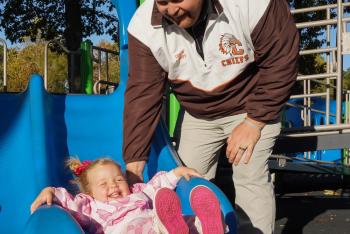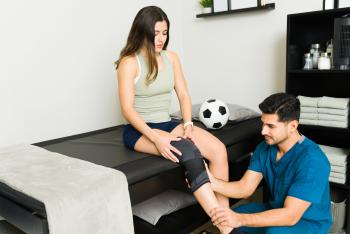When Gina noticed her daughter Francesca wasn’t hitting her gross motor milestones, she turned to...
Read More
Occupational therapy (OT) is a comprehensive, patient-centered approach to health care designed to help individuals navigate physical, mental or cognitive obstacles that impede daily activities.
“OT differs from physical therapy by concentrating on detailed, specific issues to improve daily function, catering to a broad spectrum of patients with diverse conditions,” said Holly Buono, OTL, CHT, CLT, Occupational Therapist at Inspira Sports Rehab. “Occupational therapists aim to enhance the quality of life by focusing on the meaningful activities that define one's life.”
Learn more about how this form of therapy helps people regain independence following injury, illness or challenges associated with aging or chronic conditions.
At the heart of OT is the belief that participation in everyday activities (or "occupations") is integral to health and well-being. Occupational therapists work with patients to understand their unique challenges and goals and create plans tailored to individual needs.
OT aids in skill development and rehabilitation, focusing on enhancing motor skills, coordination and balance needed for everyday tasks. Buono added, “OT also supports cognitive rehabilitation for those recovering from injuries or managing conditions like stroke or dementia through exercises that improve memory, problem-solving and organization—skills that play a big role in independence.”
Another way OT fosters independence is through the development of adaptive strategies and the use of assistive devices. “Therapists might introduce tools and technologies that compensate for physical limitations, enabling patients to perform tasks such as cooking, dressing or writing,” said Buono.
Occupational therapists are also skilled in modifying environments to make them more accessible, such as recommending changes in home or workplace layouts to reduce barriers to participation.
Education and training form another cornerstone of OT. “Therapists educate patients and their families about the nature of their conditions and the adaptive strategies they can employ to navigate daily challenges,” explained Buono. “This knowledge empowers individuals to take an active role in their care and make informed decisions about their activities and environments.”
In addition to physical and cognitive support, OT addresses the psychological and social aspects of regaining independence. “Therapists provide emotional support, helping patients cope with the frustrations and mental health challenges that may accompany their conditions,” said Buono.
OT also combats isolation and promotes a sense of belonging and purpose by facilitating participation in community activities and social engagements.
Occupational therapists often collaborate with other health care professionals, including physical therapists, speech therapists, physicians, psychologists and social workers, to ensure patient care is comprehensive and coordinated. This multidisciplinary effort supports patients in achieving their highest level of independence and leading fulfilling lives. Other modalities that Occupational Therapists use to treat the many differing needs of their patients include Certified Hand Therapy, Lymphedema Therapy, Ergonomics, Pediatric Early Intervention for developmental delays, and Vision Therapy.
Whether you’re recovering from a hand, sports or work-related injury, Inspira’s Occupational Therapy program can help you regain function and fine motor skills. Learn more here.

When Gina noticed her daughter Francesca wasn’t hitting her gross motor milestones, she turned to...
Read More
Sports medicine and physical therapy both play vital roles in injury recovery, but they serve...
Read More
Whether you’re a weekend warrior or a seasoned competitor, a few strength and mobility tips can go a...
Read More